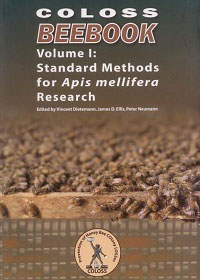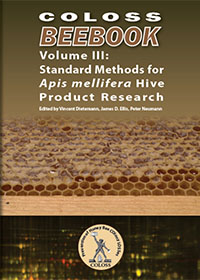The COLOSS BEEBOOK is a unique venture that aims to standardise methods for studying the honey bee. From the outset, the vision of the project has been to develop a definitive inventory of standard techniques and methods in honey bee research, in order to ensure that studies performed by different laboratories around the world would be directly comparable with each other. It is a practical manual compiling more than 2,000 standard methods in all fields of research on the honey bee, Apis mellifera, and is the definitive, but evolving, research manual. It is currently composed of 38 peer-reviewed chapters authored by more than 350 of the world’s leading honey bee experts representing 35 different countries. Chapters describe methods for studying honey bee biology, methods for understanding honey bee pests and pathogens, methods for breeding honey bees, and methods for understanding hive products, including for quality control purposes.
The BEEBOOK project is at present divided into three volumes: The COLOSS BEEBOOK, Volume I: Standard methods for Apis mellifera research; The COLOSS BEEBOOK, Volume II: Standard methods for Apis mellifera pest and pathogen research; and The COLOSS BEEBOOK, Volume III: Standard methods for Apis mellifera product research. Volumes I and II were published in 2013, the first chapters of volume III were published in 2016, and its final chapters will be published in 2021.
The online version of the BEEBOOK can be accessed by clicking on the three volumes above, and then clicking on the .pdf for each chapter.
As well as the online version, the BEEBOOK is also available as a hard copy version, for use at the laboratory bench.
The hard copy of COLOSS BEEBOOK Volume I, Standard methods for Apis mellifera research can be purchased from the IBRA Bookshop here.
The hard copy of COLOSS BEEBOOK Volume II, Standard methods for Apis mellifera pest and pathogen research can be purchased from the IBRA Bookshop here.
Volumes I and II hard copies can be purchased together at a discount from the IBRA Bookshop here.
The hard copies can also be purchased from Amazon, and depending where you are, shipping costs may be lower from this source.
The BEEBOOK project illustrates the unprecedented degree of international collaboration that the crisis in honey bees and the COLOSS network has engendered. Since the first chapters of the COLOSS BEEBOOK were published in 2013, the project has been embraced by the bee science community worldwide, and the papers published so far have been cited some 1,600 times in other refereed papers, and have been downloaded some 100,000 times from the publisher’s website. The editorial of the 2020 Special Issue of the Journal of Apicultural Research which comprises the honey chapter of Volume III, discusses the concept of the COLOSS BEEBOOK, and how it will develop in the future to embrace new threats to honey bees such as the Asian hornet, and to expand to cover the eastern honey bee Apis cerana and beekeeping itself. The paper: “The COLOSS BEEBOOK: global standards in honey bee research” can be found here (Open Access).
Publication of the COLOSS BEEBOOK was supported by the European Union COST Programme (Action FA0803). COST (European Cooperation in Science and Technology) is an intergovernmental framework for European Cooperation in Science and Technology, allowing the coordination of nationally-funded research on a pan-European level. COST is supported by the EU Research and Technological Development Framework programme. The European Science Foundation provides the COST Office through an EC contract. The Council of the European Union provides the COST Secretariat.








